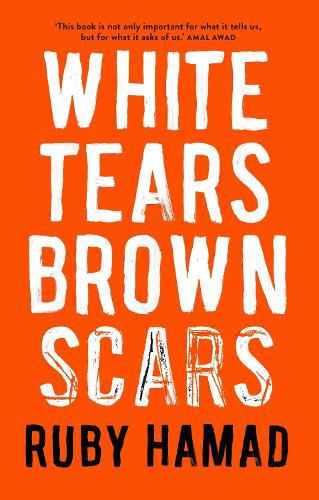Readings Newsletter
Become a Readings Member to make your shopping experience even easier.
Sign in or sign up for free!
You’re not far away from qualifying for FREE standard shipping within Australia
You’ve qualified for FREE standard shipping within Australia
The cart is loading…






When white people cry foul it is often people of colour who suffer. White tears have a potency that silences racial minorities.
White Tears/Brown Scars blows open the inconvenient truth that when it comes to race, white entitlement is too often masked by victimhood. Never is this more obvious than the dealings between women of colour and white women. What happens when racism and sexism collide?
Ruby Hamad provides some confronting answers.
$9.00 standard shipping within Australia
FREE standard shipping within Australia for orders over $100.00
Express & International shipping calculated at checkout
When white people cry foul it is often people of colour who suffer. White tears have a potency that silences racial minorities.
White Tears/Brown Scars blows open the inconvenient truth that when it comes to race, white entitlement is too often masked by victimhood. Never is this more obvious than the dealings between women of colour and white women. What happens when racism and sexism collide?
Ruby Hamad provides some confronting answers.
In 2018, journalist Ruby Hamad wrote an article for The Guardian Australia titled ‘How white women use strategic tears to silence women of colour’. It received worldwide praise andcondemnation. An African American television journalist from Kansas City had her employment contract terminated for sharing the article on her private Facebook page. The overwhelming response that Hamad received to the article, both positive and negative, inspired her to write a book detailing the consequences for women of colour when white women respond to accusations of racism or oppression by playing the victim.
Hamad argues that until white women fully acknowledge the effects of racial and colonial oppression, ‘mainstream Western feminism cannot be anything more than another iteration of white supremacy’. She questions gender as the main foundation of oppression and argues that race is a major factor that is often dismissed. While ‘intersectionality’ is a buzz word used bymainstream white feminists, it is often superficially invoked and when these same feminists are accused of perpetuating oppression by excluding women of colour, they often play the victim rather than acknowledge their role in the maintenance of white power structures.
Hamad posits that this behaviour is based on a long history of white womanhood and ‘distress of the damsel’ that has been a tool of white supremacy utilised to detract from the behaviour of white men. Furthermore, Hamad writes that ‘white women have to free themselves from the lingering notion that white supremacy has socialised them into – that they know what is best for non-white women and their job is to save us from ourselves.’
This book is an incredibly necessary and intelligent critique of mainstream feminism and an important validation for women of colour who have suffered in their interactions with white women.
See what the Readings’ team have to say on the blog, discover related events and podcast episodes.